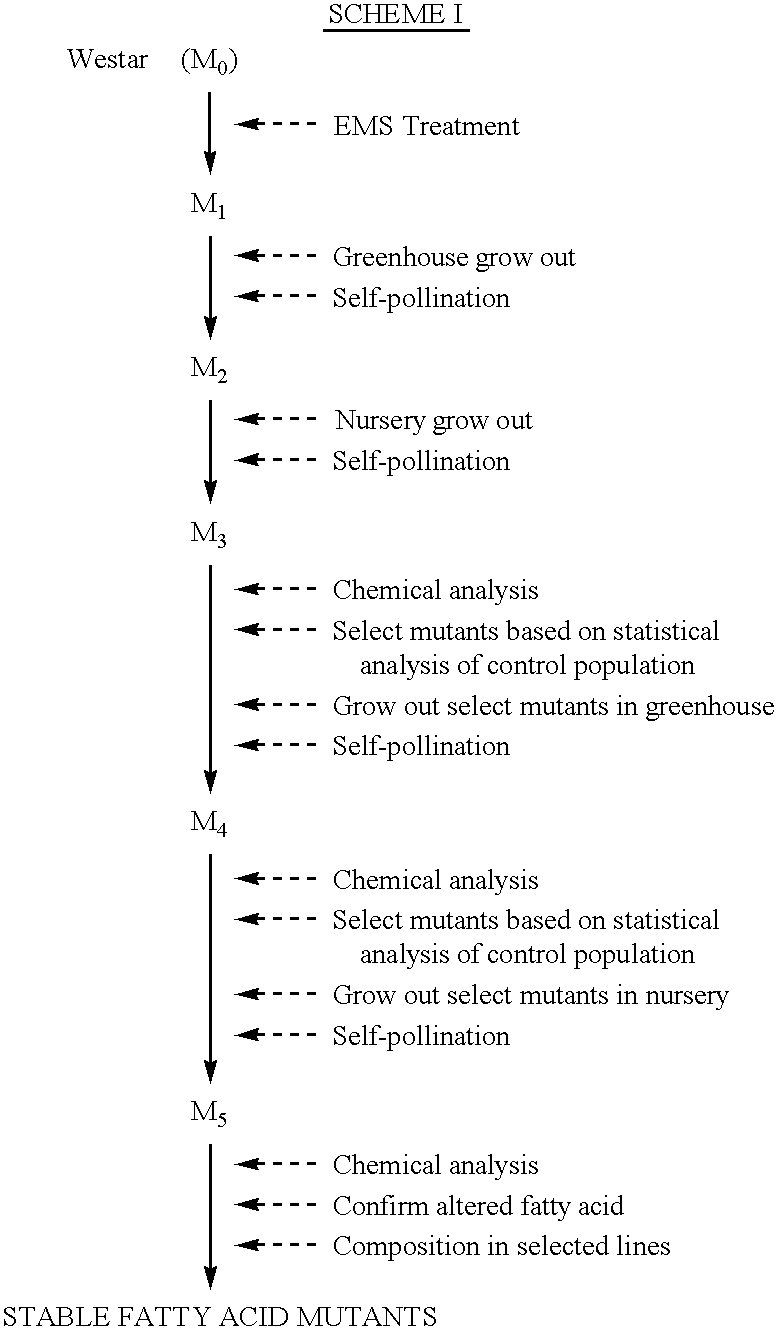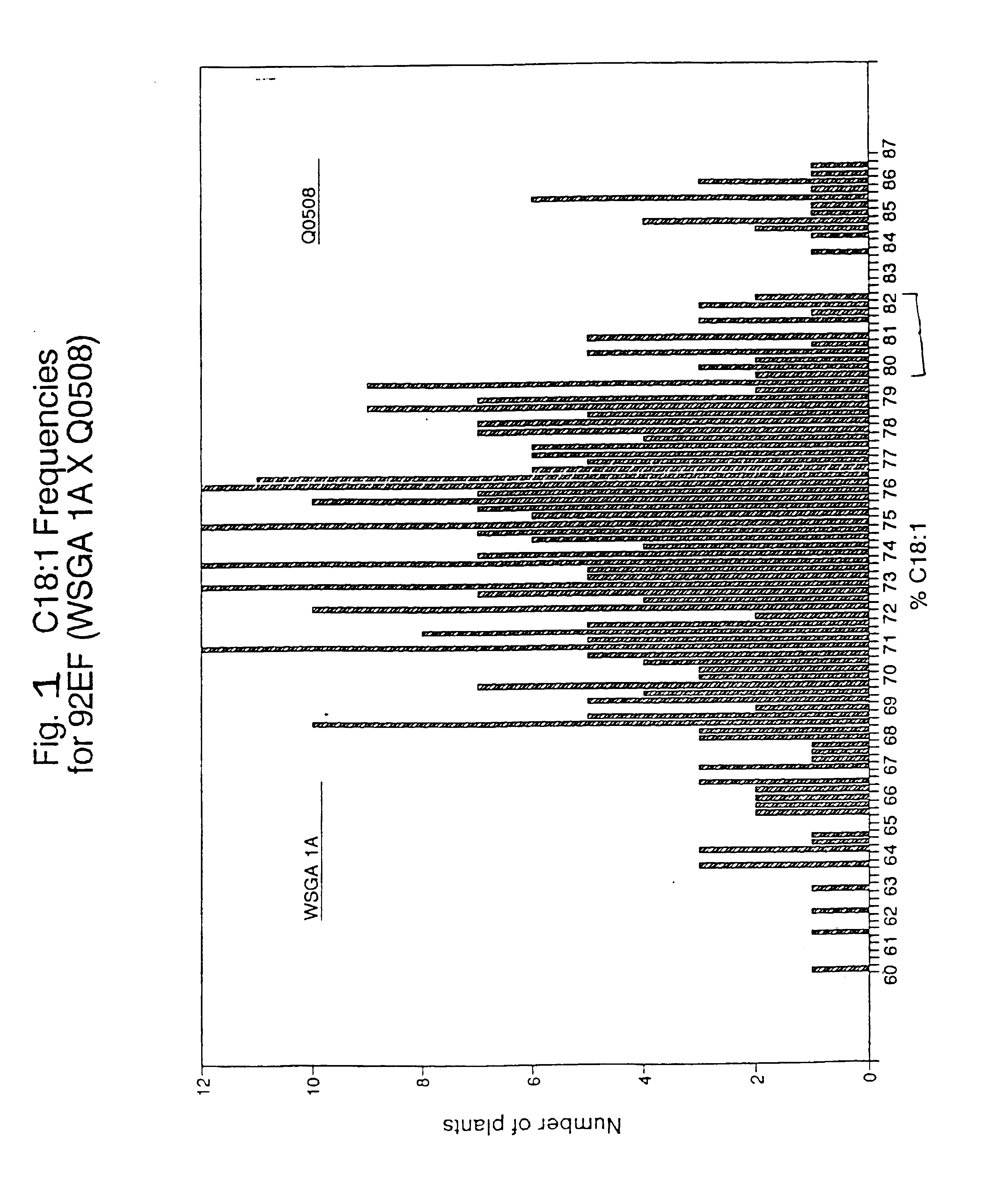Brassica or helianthus plants having mutant delta-12 or delta-15 sequences
a technology of helianthus and mutant sequences, applied in the field of mutant sequences of brassica seeds and plants, can solve the problems of low -linolenic acid mutation derived from the rakow mutation breeding program that did not have direct commercial application, no teachings that disclose mutations in delta-12 or delta-15 fatty acid desaturase coding sequences from plants, and no method for developing plant lines that contain delta-12 or delta-15 fatty acid desaturase gen
- Summary
- Abstract
- Description
- Claims
- Application Information
AI Technical Summary
Benefits of technology
Problems solved by technology
Method used
Image
Examples
example 1
Selection of Low FDA Saturates
[0076]Prior to mutagenesis, 30,000 seeds of B. napus cv. Westar seeds were preimbibed in 300-seed lots for two hours on wet filter paper to soften the seed coat. The preimbibed seeds were placed in 80 mM ethylmethanesulfonate (EMS) for four hours. Following mutagenesis, the seeds were rinsed three times in distilled water. The seeds were sown in 48-well flats containing Pro-Mix. Sixty-eight percent of the mutagenized seed germinated. The plants were maintained at 25° C. / 15° C., 14 / 10 hr day / night conditions in the greenhouse. At flowering, each plant was individually self-pollinated.
[0077]M2 seed from individual plants were individually catalogued and stored, approximately 15,000 M2 lines was planted in a summer nursery in Carman, Manitoba. The seed from each selfed plant were planted in 3-meter rows with 6-inch row spacing. Westar was planted as the check variety. Selected lines in the field were selfed by bagging the main raceme of each plant. At matu...
example 2
[0098]An additional low FDA saturate line, designated A149.3 (ATCC 40814), was also produced by the method of Example 1. A 50-seed bulk analysis of this line showed the following fatty acid composition: C16:0—3.6%, C18:0—1.4%, C18:1—65.5%, C18:2—18.3%, C18:3—8.2%, FDA Sats—5.0%, Total Sats—5.9%. This line has also stably maintained its mutant fatty acid composition to the M5 generation. In a multiple location replicated trial the yield of A149 was not significantly different in yield from the parent cultivar Westar.
example 3
[0099]An additional low palmitic acid and low FDA saturate line, designated M3094.4 (ATCC 75023), was also produced by the method of Example 1. A 10-seed bulk analysis of this line showed the following fatty acid composition: C16:0—2.7%, C18:0—1.6%, C18:1—66.6%, C18:2—20.0%, C18:3—6.1%, C20:1—1.4%, C22:1—0.0%, FDA Saturate—4.3%, Total Saturates—5.2%. This line has stably maintained its mutant fatty acid composition to the M5 generation. In a single replicated trial the yield of M3094 was not significantly different in yield from the parent cultivar.
[0100]M3094.4 was crossed to A144, a low palmitic acid mutation (Example 1) for allelism studies. Fatty acid composition of the F2 seed showed the two lines to be allelic. The mutational events in A144 and M3094, although different in origin, are in the same gene.
PUM
| Property | Measurement | Unit |
|---|---|---|
| length | aaaaa | aaaaa |
| length | aaaaa | aaaaa |
| temperature | aaaaa | aaaaa |
Abstract
Description
Claims
Application Information
 Login to View More
Login to View More - R&D
- Intellectual Property
- Life Sciences
- Materials
- Tech Scout
- Unparalleled Data Quality
- Higher Quality Content
- 60% Fewer Hallucinations
Browse by: Latest US Patents, China's latest patents, Technical Efficacy Thesaurus, Application Domain, Technology Topic, Popular Technical Reports.
© 2025 PatSnap. All rights reserved.Legal|Privacy policy|Modern Slavery Act Transparency Statement|Sitemap|About US| Contact US: help@patsnap.com


